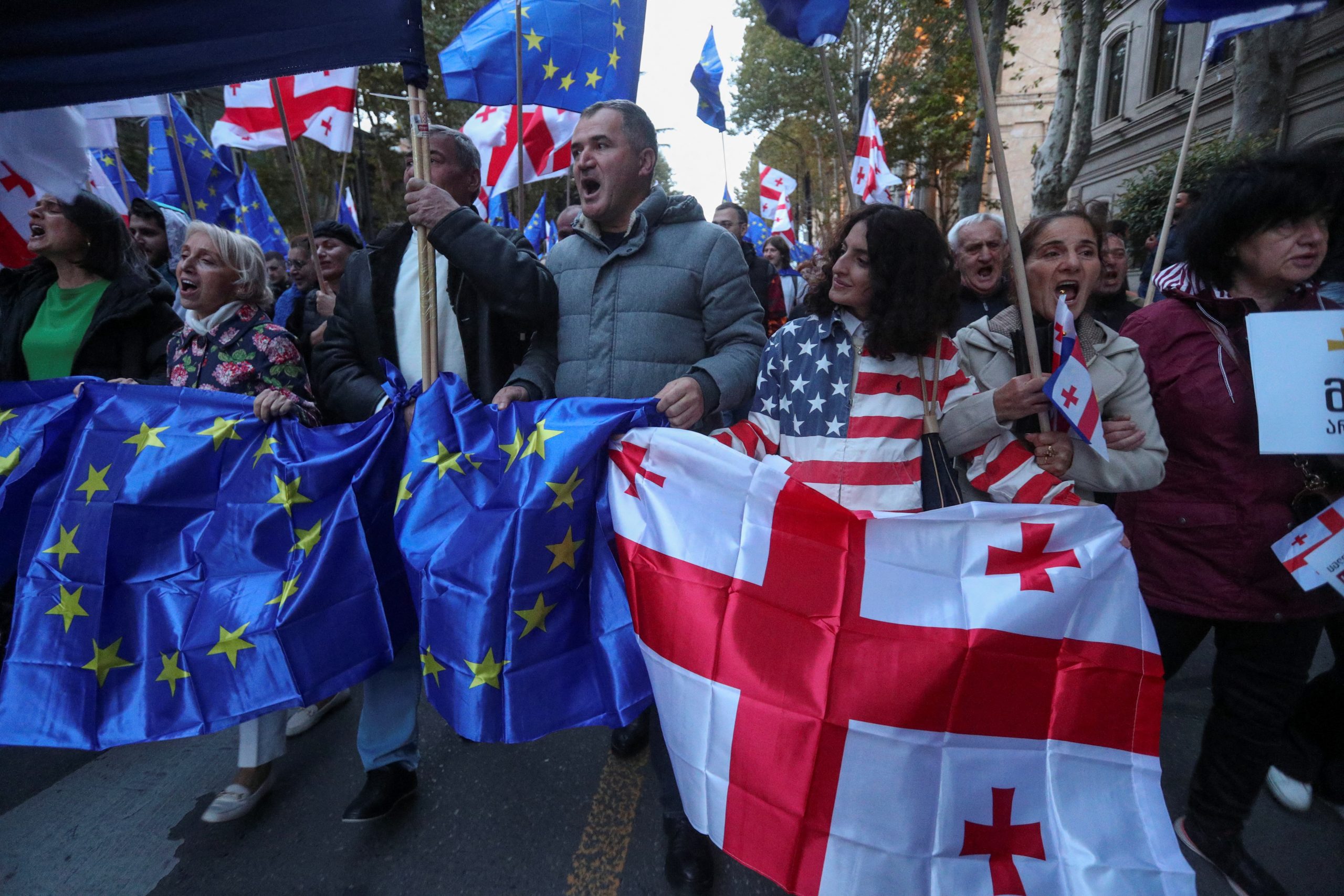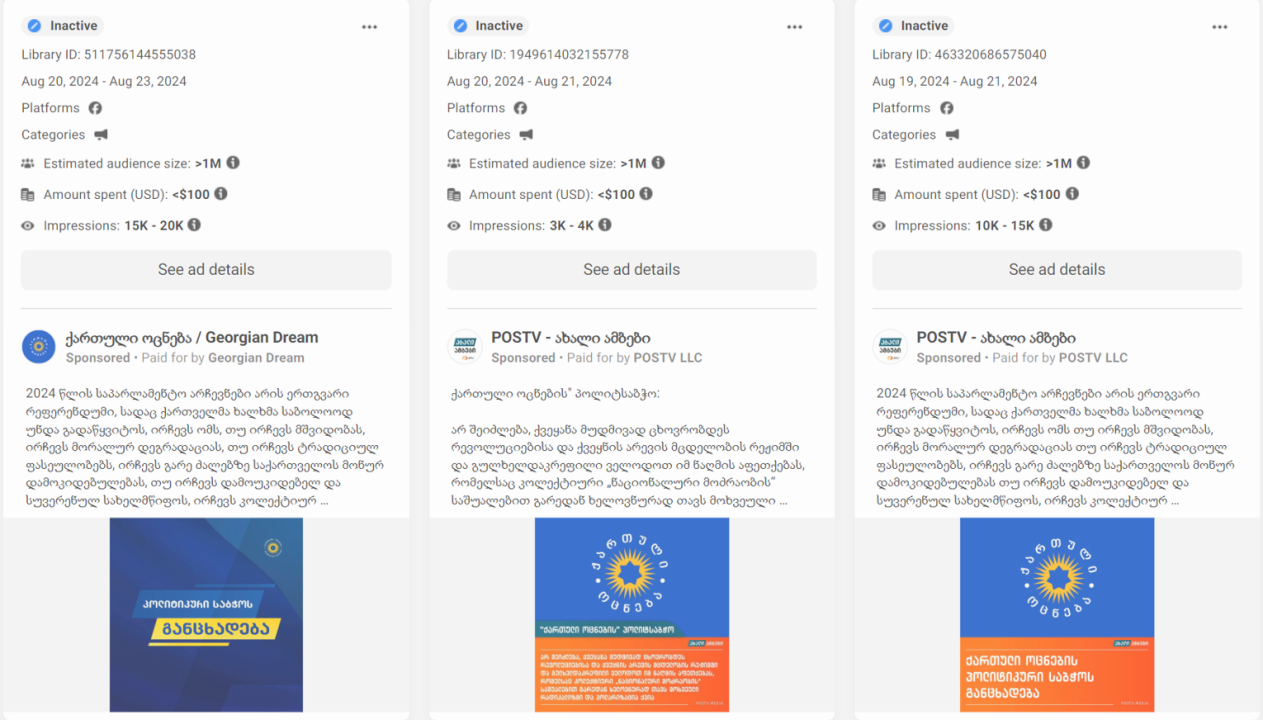Georgia’s ruling party using Facebook ads to claim Western interference in the country’s election
Facebook ads increased sharply over the course of September 2024 just ahead of the pivotal vote scheduled for October 26
Georgia’s ruling party using Facebook ads to claim Western interference in the country’s election
Share this story

BANNER: Supporters of Georgia’s pro-Western and pro-EU opposition groups held a joint campaign rally in Tbilisi on October 20, 2024, ahead of the upcoming parliamentary elections. (Source: Reuters/Irakli Gedenidze)
Editor’s note: On the morning of October 24, 2024, officials from the Georgian Ministry of Finance’s Investigative Service raided the homes of Eto Buziashvili and Sopo Gelava, the two authors of this case study. Earlier this week, Eto published a dispatch from Tbilisi detailing the ways Russia is meddling in an upcoming election that could, as Buziashvili notes, “determine Georgia’s future.” You can read the Atlantic Council’s statement on the home raids here.
In the lead-up to Georgia’s critical parliamentary elections on October 26, the Georgian Dream government and its affiliated media outlets sponsored hundreds of Facebook ads promoting a narrative that the West seeks to interfere in the vote. As the elections approached, Georgia’s ruling party increased the frequency of ads accusing the West of meddling in Georgia’s electoral affairs, with some ads claiming the West sought to instigate a coup. The aim of this narrative is to preemptively discredit and undermine any criticism or civic activism that may arise in response to the election results.
Following Russia’s 2022 invasion of Ukraine, the Georgian Dream government escalated its anti-West rhetoric, particularly after widespread protests were held in 2023 and 2023 against the foreign agents law, which resembles Russian legislation and forces a “foreign agent” label onto any Georgian non-governmental organization receiving support from Western government agencies. The Georgian Dream-led government has consistently shared narratives that portray the West as orchestrating unrest and attempting to destabilize Georgia via its civil society. For example, in October 2023, the State Security Service of Georgia accused the US Agency for International Development (USAID) of funding organizations to foment civil unrest in the country. The narrative that claims the West, particularly the United States, instigates coups or revolutions to interfere in foreign affairs is not new. It is a narrative commonly shared by the Kremlin in its disinformation campaigns. For instance, Maria Zakharova, spokesperson for the Russian Ministry of Foreign Affairs, and Sergei Naryshkin, director of the Russian Foreign Intelligence Service (SVR), presented similar narratives ahead of the Georgian vote that accused the West of using organizations, like the Organization for Security and Co-operation in Europe’s Office for Democratic Institutions and Human Rights, to conspire to manipulate election results in Georgia and other countries. The SVR also issued a statement in September 2024 accusing the United States of planning to incite mass protests in Georgia to seize power.
Methodology
The DFRLab analyzed political ads published across five Facebook pages between June 1 and October 20, 2024, to examine whether the Georgian Dream and government-affiliated media sought to reach a wider audience via paid ads to promote the Western inference narrative. The analysis included three Facebook pages belonging to two government-affiliated media outlets (TV Imedi, POSTV – ანალიტიკა [POSTV – analytics], and POSTV – News [POSTV – ახალი ამბები]), and the pages of Prime Minister Irakli Kobakhidze and the official page of the Georgian Dream party. The timeframe selected for analysis was determined by when the Georgian Dream began its pre-election campaigning. These pages were selected over other Georgian Dream-affiliated pages due to them being documented as top spenders, according to the Meta Ad Library Report.
After exporting the ads, the DFRLab filtered the content of the ads based on eight Georgian-language keywords commonly used in Georgian Dream propaganda that promotes the Western interference narrative. The keywords included “revolution,” “overthrow,” “unrest,” “coup,” “interference,” “destabilization,” “external/from outside,” and “agents.”
A limitation in the collected ads concerned sponsored video content. Numerous video clips across all five pages—including brief interviews and longer speeches by Georgian Dream leaders—contained these narratives, as verified by the DFRLab by manually examining a random selection. However, due to the limited availability of video transcription tools for Georgian language content, we excluded video clips from the analysis. However, it is important to note that if video content featuring these narratives had been included, the overall volume of ads promoting this narrative would have increased.
After filtering the ads, 257 ads remained in the dataset. The highest number of ads containing these keywords was from the POSTV – News Facebook page, which published 153 political ads centered around narratives of Western interference. This was followed by the official Facebook page of the Georgian Dream party, which published forty-eight ads on the topic. The chart below illustrates the breakdown of ads identified by DFRLab.
A column chart showing the number of ads published by the selected Facebook pages between June 1 and October 20 conveying the message that the West seeks to meddle in Georgian elections. (Source: @SGelava/DFRLab via Meta ad library and Flourish)
Keywords
Among the identified ads, the keyword “external/from outside” was the most frequently used, appearing ninety-one times in our database. This was followed by the term “agents,” which carries a negative connotation in the Georgian context, implying a person is spying for a hostile country. The third most common term was “revolution,” with forty-nine instances, closely followed by “interference,” which appeared forty-two times.
A bubble chart shows the number of mentions for the pre-identified keywords in the analyzed political ads. (Source: @SGelava/DFRLab via Meta ad library & Flourish)
Ads featuring the keyword “external/from outside” primarily pushed the narrative that there are “unprecedented” attempts at interference in Georgia’s elections from “outside” forces. Initially, Georgian Dream leaders equated the threats of both Russian and Western interference, but as the elections approached, the narrative shifted to claim that Russia lacks the resources to meddle, while the West has the capacity to do so.

The second-most frequently used keyword in the ads, “agents,” referred to “Western-backed” opposition parties and civil society organizations “working to undermine Georgia.” This narrative was typically presented alongside other keywords like “revolution,” “unrest,” “destabilization,” and “coup,” which reinforced the idea that Western forces were planning to destabilize Georgia and orchestrate a coup following the elections. As for the keyword “interference,” Georgian Dream ads framed Western criticism of the Georgian Dream as an “organized effort.” These ads supported public narratives being shared by Georgian Dream leaders, for example, in late September, Chairman of the Parliament of Georgia Shalva Papuashvili claimed that Western statements are a form of “foreign interference in the political choices of the population and a deliberate attempt to manipulate the election results.”
Increasing ads
During the summer period, POSTV – News invested the most in promoting the Western interference narratives through targeted ads, while other pages published minimal sponsored content on the topic. However, starting from September 1, the frequency of ads published across all five pages significantly increased. During the summer period, typically, there was a gap of a couple of days between each ad’s release. However, from September onward, the pages began promoting the narrative via ads on an almost daily basis.
Graph shows the frequency of published ads across the five Facebook pages, each promoting Western interference narratives, during the period of June 1-October 20. (Source: @EtoBuziashvili/DFRLab via Meta ad library and Tableau Public)
Two notable peaks stand out when examining the frequency of published ads: July 25 and September 15. These dates marked significant surges in the volume of ads. Both peaks were preceded by similar events that may explain why the pages intensified their outputs promoting the Western interference narrative. The surge on July 25 was preceded by a July 23 hearing in the US House of Representatives Foreign Affairs Committee, where high-level US government officials criticized the Georgian Dream-led government for its undemocratic trajectory. Similarly, the September 15 peak followed a September 12 hearing in the US Senate Foreign Relations Committee, during which senators discussed the Georgian government’s undemocratic actions.
Line graph shows the combined frequency of published ads across all five Facebook pages promoting the Western interference narratives during the period of June 1 to October 20. (Source: @EtoBuziashvili/DFRLab via Meta ad library and Tableau Public)
The DFRLab also analyzed the cost of the identified ads. The majority, 203 out of 257, were sponsored for less than $99 USD. Eight ads published by the Georgian Dream official page cost between $1,000 to $2,999 USD in total. Seven of these ads featured speeches by the party’s founder Bidzina Ivanishvili delivered in various Georgian towns as part of the election campaign. The eighth ad was a letter written by Ivanishvili and published on the anniversary of Georgian Dream’s rise to power in 2012. Ivanishvili’s speeches reflected the narratives and keywords discussed above, claiming that “external forces” are attempting to destabilize and undermine the country. Notably, no other party figures received as much sponsorship as Ivanishvili. His content was heavily prioritized, indicating a clear focus on maximizing his visibility and influence.
It appears that by preemptively accusing the West of planning to disrupt the Georgian elections, Georgia’s ruling party seeks to undermine the electoral landscape and frame any potential protests related to the election results as illegitimate.
Cite this case study:
Eto Buziashvili and Sopo Gelava, “Georgia’s ruling party using Facebook ads to claim Western interference in the country’s election,” Digital Forensic Research Lab (DFRLab), October 25, 2024, https://dfrlab.org/2024/10/25/georgia-ruling-party-facebook-ads/.

